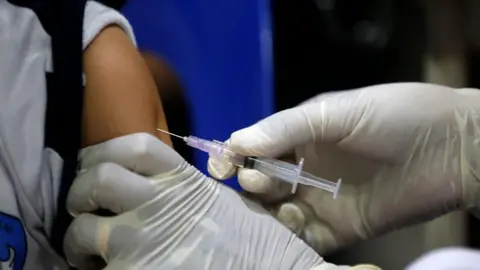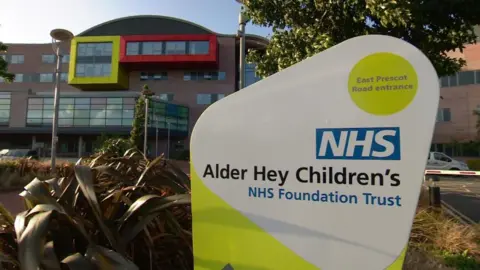Measles symptoms and what action should you take?
 EPA
EPAMeasles cases have been rising across Merseyside, prompting urgent warnings and appeals from healthcare professionals.
A child died from the highly infectious disease this weekend at Alder Hey Children's Hospital in Liverpool.
A drop in the uptake of the measles, mumps and rubella (MMR) vaccination in recent years has been blamed for the recent increased number of cases, with the community now being urged to get themselves and their children vaccinated to prevent a major outbreak.
Given how serious measles can be - especially for children - it is important to know what the symptoms are and what to do if you think you or your child might have the disease.
What are the symptoms?
The early signs of measles are similar to those of many common childhood illnesses.
According to Alder Hey's chief nurse Nathan Askew, the first symptoms are usually a cough, a runny nose and, sometimes, red eyes.
It then progresses with the appearance of a "really distinctive" rash which starts on the face or behind the ears and then spreads to the rest of the body.
"Unfortunately, you're infectious for days before the rash presents, and so what can look like a normal childhood illness can actually be really contagious before it's diagnosed as measles," Mr Askew told BBC Radio Merseyside.
Why is measles so serious?
Measles can leave people seriously ill and even be fatal.
Professor Louise Kenny, executive pro vice chancellor of the Faculty of Health and Life Sciences at the University of Liverpool, said she saw a child die of measles when she was a junior doctor in the early 1990s.
She said the child contracted measles before their first birthday, which meant they had not yet been vaccinated, and died from "rare complications" related to the infection about 10 years later.
This weekend's death is believed to have been the second child in England to have died in the past five years with measles.
Since June at Alder Hey alone, 17 children have been treated with the disease.

What should I do if I think my child has measles?
The NHS advises parents or carers who think their child could have measles to call their GP surgery or NHS 111 before turning up to a hospital, urgent care centre or GP practice.
This is because the virus is very contagious, and it is important not to expose vulnerable people to it.
In an open letter to parents and carers about the recent spike in cases, bosses at Alder Hey said measles was particularly dangerous to children under the age of one and those who have other serious illnesses including cancer.
Why are measles cases rising?
Mr Askew said serious cases of measles "basically all went away" early in his career, but had started to increase recently due to a fall in the number of children being vaccinated.
There have been 500 cases of measles so far this year in England.
The World Health Organization wants 95% of children to be fully vaccinated by their fifth birthday.
Across the UK, Prof Kenny said 84% of children were vaccinated - far higher than the 73% in Liverpool.
She said there had been an increase in "vaccine hesitancy" during the Covid-19 pandemic.
"I'm a parent myself, and every parent wants to do their best for their child," she said.
"But the reality is that vaccinations, and particularly the MMR vaccine, is safe."
How do I check my vaccination status?
It is recommended that children get their first dose of the MMR vaccine when theyt are 12 months old, and their second at about three years and four months.
If you are not sure if your child is up to date with their jabs, the best thing to do is to contact your GP.
Prof Kenny explained it was "never too late" to get vaccinated.
"If a child has had one vaccine but not the second, we encourage parents or teenagers or adults to get vaccinated," she said.
The vaccine is free and available through your local GP surgery.
Read more stories from Cheshire, Lancashire, Greater Manchester and Merseyside on the BBC, watch BBC North West Tonight on BBC iPlayer and follow BBC North West on X.
